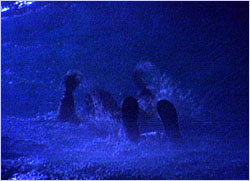
|
 |
 |
 Human Response
Human ResponseFire | Car | Plane | Ship Near Drowning Of course, drowning is the most immediate danger from a shipwreck. When someone inhales water, red blood cells are destroyed, the blood is diluted, and the resulting lack of oxygen eventually causes death. Fluid can also accumulate in the lungs (pulmonary edema), which can be fatal as well. The first step to prevent drowning, needless to say, is to get yourself or the victim out of the water. Life rafts, life jackets, driftwood, or a shoreline if you're lucky—whatever it takes. If the victim's breathing has stopped, begin mouth-to-mouth resuscitation as soon as possible, even if you're still in shallow water. Continue as you move her ashore. Hypothermia A shipwreck will often lead to sustained exposure to cold water. Enough exposure will result in your body losing more heat than it can generate, and this leads to hypothermia. Symptoms of hypothermia are a body temperature below 94°F, shivering, slurred speech, abnormally slow breathing, cold and pale skin, dizziness, lethargy, and apathy. Symptoms come on slowly, and you may be unaware that you are in need of treatment. Get yourself or the victim out of the wind, cover the head, and insulate the entire body from the cold ground or water. If at all possible, get to a warm area and cover with blankets. If breathing or pulse seem dangerously slow, initiate CPR. Do not give the victim alcoholic drinks. Do give warm nonalcoholic drinks if possible (unless he or she is vomiting). Thirst "Water, water everywhere, nor any drop to drink" goes the poem, and victims of shipwreck may well discover how painfully true Coleridge's words were. Saltwater is impotable, of course, and it's unlikely you'll have apparatus for distilling fresh water. As William Langewiesche describes in his book Sahara Unveiled, thirst can be one of the most horrible fates. Dehydration causes fatigue, irritability, and fever, followed by dizziness, circulatory problems, and eventually terrific pain, delirium, and death. When on an extensive boat trip, you should carry on board far more potable water than you expect to need. If at all possible, take it with you when you abandon ship. If you do run out of water while awaiting rescue, try to remain calm. As Langewiesche puts it, "The only way to stretch your life is to reduce your sweating: stay put, stay shaded, and keep your clothes on." Sunburn Most people have experienced mild sunburn from a day at the beach, but prolonged exposure to the sun while waiting to be rescued from a shipwreck might cause more severe sunburn. Swelling, blisters, severe pain, and an overall sensation of illness can result. Anyone taking a boat ride should use sunscreen anyway, as he or she will probably be spending time out in the sun. Keeping strong sunscreen close to the body—in your pants pockets or the pockets of a jacket you'll be wearing on board the ship—will ensure that you'll be prepared should you have to abandon ship. Heatstroke Prolonged exposure to sun and heat while waiting for rescue may overload your body's normal temperature control mechanism. The result can be heatstroke, indicated by high fever, hot dry skin, rapid heartbeat and breathing, either elevated or lowered blood pressure, and delirium. Drink as much as possible, avoid alcohol, and, of course, get into the coolest, shadiest spot possible. Cover yourself or the victim with damp sheets or spray her with water, and fan her with your hands or anything available. If breathing ceases, begin CPR. Escape Through Time | Skydive | Human Response Survivor Stories | Pioneers of Survival | Survival Strategies Resources | Teacher's Guide | Transcripts | Site Map | Escape! Home Editor's Picks | Previous Sites | Join Us/E-mail | TV/Web Schedule About NOVA | Teachers | Site Map | Shop | Jobs | Search | To print PBS Online | NOVA Online | WGBH © | Updated November 2000 |